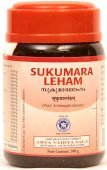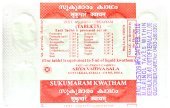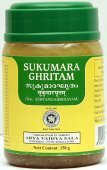Potagala, Poṭagala, Pota-gala: 9 definitions
Introduction:
Potagala means something in Hinduism, Sanskrit, biology. If you want to know the exact meaning, history, etymology or English translation of this term then check out the descriptions on this page. Add your comment or reference to a book if you want to contribute to this summary article.
Biology (plants and animals)
Source: Wisdom Library: Local Names of Plants and DrugsPotagala in the Sanskrit language is the name of a plant identified with Arundo donax L. from the Poaceae (Grass) family having the following synonyms: Donax arundinaceus, Donax sativa, Arundo bengalensis. For the possible medicinal usage of potagala, you can check this page for potential sources and references, although be aware that any some or none of the side-effects may not be mentioned here, wether they be harmful or beneficial to health.
Potagala in the Oriya language is the name of a plant identified with Phragmites karka from the Poaceae (Grass) family having the following synonyms: Arundo karka, Arundo roxburghii, Phragmites roxburghii.
Source: Google Books: CRC World Dictionary (Regional names)1) Potagala in India is the name of a plant defined with Arundo donax in various botanical sources. This page contains potential references in Ayurveda, modern medicine, and other folk traditions or local practices It has the synonym Aira bengalensis (Retz.) J.F. Gmel. (among others).
2) Potagala is also identified with Chionachne gigantea It has the synonym Coix koenigii (Sprengel) Thwaites & Hook.f. (etc.).
3) Potagala is also identified with Chionachne koenigii It has the synonym Polytoca barbata (Roxb.) Stapf (etc.).
4) Potagala is also identified with Coix koenigii It has the synonym Chionachne barbata (Roxb.) R. Br. (etc.).
5) Potagala is also identified with Lobelia nicotianaefolia It has the synonym Lobelia nicotianifolia Roth (etc.).
Example references for further research on medicinal uses or toxicity (see latin names for full list):
· Botanical Gazette, or ‘Paper of Botanical Notes’ (1984)
· Current Science (1981)
· Flora Indica; or, descriptions of Indian Plants (1832)
· Enumeratio Plantarum Zeylaniae (1864)
· Systema Naturae (1791)
· Flora des Nordostdeutschen Flachlandes (1898)
If you are looking for specific details regarding Potagala, for example extract dosage, side effects, pregnancy safety, chemical composition, diet and recipes, health benefits, have a look at these references.

This sections includes definitions from the five kingdoms of living things: Animals, Plants, Fungi, Protists and Monera. It will include both the official binomial nomenclature (scientific names usually in Latin) as well as regional spellings and variants.
Languages of India and abroad
Sanskrit dictionary
Source: DDSA: The practical Sanskrit-English dictionaryPoṭagala (पोटगल).—
1) a kind of reed (nala).
2) a kind of grass (kāśa); पोटगलास्तु धमनो नडः (poṭagalāstu dhamano naḍaḥ) Abh. Chin.11.93.
3) a kind of fish.
Derivable forms: poṭagalaḥ (पोटगलः).
Poṭagala is a Sanskrit compound consisting of the terms poṭa and gala (गल).
Source: Cologne Digital Sanskrit Dictionaries: Shabda-Sagara Sanskrit-English DictionaryPoṭagala (पोटगल).—m.
(-laḥ) 1. A reed, (Arundo tibialis, Rox.) 2. A sort of grass, (Saccharum spontanium.) 3. A fish. E. poṭa uniting, (with the wind,) gal to go, aff. ac, waving in the wind.
Source: Cologne Digital Sanskrit Dictionaries: Monier-Williams Sanskrit-English Dictionary1) Poṭagala (पोटगल):—[=poṭa-gala] [from poṭa] m. (only [cf. Lexicographers, esp. such as amarasiṃha, halāyudha, hemacandra, etc.]) a species of reed
2) [v.s. ...] Saccharum Spontaneum
3) [v.s. ...] a fish
4) [v.s. ...] = pañcajanya.
Source: Cologne Digital Sanskrit Dictionaries: Yates Sanskrit-English DictionaryPoṭagala (पोटगल):—[poṭa-gala] (laḥ) 1. m. A reed (Arundo tibialis); sort of grass (Sacharum spontaneum); a fish.
[Sanskrit to German]
Sanskrit, also spelled संस्कृतम् (saṃskṛtam), is an ancient language of India commonly seen as the grandmother of the Indo-European language family (even English!). Closely allied with Prakrit and Pali, Sanskrit is more exhaustive in both grammar and terms and has the most extensive collection of literature in the world, greatly surpassing its sister-languages Greek and Latin.
Kannada-English dictionary
Source: Alar: Kannada-English corpusPōṭagala (ಪೋಟಗಲ):—[noun] the grass Cyperus amabilis of Cyperaceae family.
--- OR ---
Pōṭagaḷa (ಪೋಟಗಳ):—[noun] = ಪೋಟಗಲ [potagala].
Kannada is a Dravidian language (as opposed to the Indo-European language family) mainly spoken in the southwestern region of India.
See also (Relevant definitions)
Ends with: Mahapotagala.
Full-text: Mahapotagala, Potaki, Pota.
Relevant text
Search found 1 books and stories containing Potagala, Poṭagala, Pota-gala, Poṭa-gala, Pōṭagala, Pōtagala, Pōṭagaḷa; (plurals include: Potagalas, Poṭagalas, galas, Pōṭagalas, Pōtagalas, Pōṭagaḷas). You can also click to the full overview containing English textual excerpts. Below are direct links for the most relevant articles:
Sushruta Samhita, Volume 5: Kalpasthana (by Kaviraj Kunja Lal Bhishagratna)
Related products



